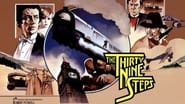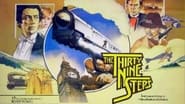Boobirt
Stylish but barely mediocre overall
Supelice
Dreadfully Boring
Pacionsbo
Absolutely Fantastic
Abegail Noëlle
While it is a pity that the story wasn't told with more visual finesse, this is trivial compared to our real-world problems. It takes a good movie to put that into perspective.
Paul Andrews
The Thirty Nine Steps is set during 1914 & starts in London late one night as three men discuss a potential threat to world peace & England, retired secret agent Scudder (John Mills) tells Sir Hugh & Lord Harkness (William Squire) about a plan by three Prussian enemy agents to assassinate the Greek prime minister who is on an official visit to London & plunge all of Europe into a war. Soon after the meeting both Hugh & Harkness are murdered & Scudder know's he is next so he ask's his neighbour Richard Hannay (Robert Powell) for help & to shelter him until he can work out the details of the Prussain's plans, collect proof &prevent the start of a World War. However the Prussain agents find Scudder & murder him, Hannay is blamed for the murder & goes on the run to clear his name, follow up Scudder's leads & try to stop the war himself, but no-one seems to want to believe Hannay & Scudder's notebook is missing...This British production was directed by Don Sharp & was the third time that the novel The 39 Steps by John Buchan had been adapted for the silver screen following Alfred Hitchcock's original The 39 Steps (1935) & the remake The 39 Steps (1959), while I have not read the book nor seen Hictchcock's take on it I have seen the 1959 version before & I have to say I much prefer this one & I think it's superior in just about every way although still not perfect by any means. While watching this it's clear that while the general feel of the film is similar & many of the same character's appear the basic story is different & the ending also is very different & thankfully ditches the awful idea of Mr. Memory being an agent for evil & instead has a nice, if somewhat short, little set-piece in & outside of London landmark Big Ben. The two killers chasing Hannay, the meeting & murder of a British agent in his flat, the train journey to Scotland, the bridge dangling scene, the hike across the moors, the attractive female Hannay meets, the police Inspector on Hannay's trail & even a scene in which Hannay has to give a speech in a case of mistaken identity. At an hour & forty odd minutes the pace drops occasionally & maybe this isn't as action packed as some may want but it's a pretty solid story of mystery & enemy agents & assassination plots with good character's (although Alex doesn't seem bothered by the murder of her fiancé at all) although the bad guy Appleton doesn't get a big speech to try & justify what he is doing & the ending is rather abrupt. The script is gripping, the mystery aspects work well enough & there's enough incident to keep one interested throughout. I liked it quite a bit actually.While the 1959 version of The 39 Steps was bright & colourful this one is far more gritty & grey which suits the Victorian period setting very well, the moors actually look like rough terrain rather than pretty fields & the special effects are obviously better this time around as well. The production design is great, the costumes, sets & props all look authentic & add character to the visual style of it, the Big Ben ending feels a little silly as Hannay just decides to dangle hundreds of feet in the air without even thinking about it & the sequence doesn't really lead to anything spectacular. Relying on story & boyish adventure there's no real violence or gore & no profanity so this is one all the family could watch.Filmed on location in London & Scotland. The production values are great & this is a fine looking film. The acting is good from a solid Brisith cast including Powell, David Warner, Sir John Mills & George Baker.The Thirty Nine Steps is a cracking little Saturday afternoon spy adventure film with an attractive period setting & a pretty solid & suspenseful script that goes up & down the country & ends on a lofty set-piece in & outside Big Ben. A good way to pass a couple of hours, you could do a lot worse.
hgregor-991-286108
R Houghton's review claims that "...with this version, we finally get the story as it was written." This is a very long way from true. To note only three departures, the thirty-nine steps of the original text do not refer to the steps leading up to Beg Ben, but to a staircase leading from a house in Bradgate down to the sea; in the original text, Scudder is knifed in Hannay's flat; and the scene of Hannay clinging to the hands of the clock appears nowhere in Buchan's novel.But all that said, this production is a fine piece of work in its own right, having great pace, style and atmosphere, and with some first-class acting from Robert Powell.
roger-763
A great film and underrated because of its predecessors over inflated significance. Robert Powell's finest hour and a great cast of actors and actresses. The period setting of very late Edwardian and early 1900's feel is very accurate and pleasing to the eye. The steam train and Big Ben scenes are magnificent. The characterization is superb and the acting first class. Making any other version very unlikely to reach the zenith of the performances in this dramatization.The Late Sir John Mills adds urgency and class to the film, and the scene where Scudder's identity is revealed to the Prussian agents outside in the street, outside his apartment, is brilliantly played, and draws us into the film and the musical score adds excitement, urgency, verve and great atmosphere and grace.The film's warning of impending war with Germany only adds to the fascination with the film, and through retrospect we know that the First World happens, but the film's message of British agents and anyone caught up in espionage, during these tense years. Only goes to show how Britain was buying time, and trying to hold off the advances of its rapidly catching up super-power neighbour, that was becoming Germany.The Grand finale at Big Ben at Westminster was a treat to watch.The film cannot be faulted, because everything is flowing in pure visual delight.
kenharris8
Much like "North by Northwest" but without a name star like Cary Grant attached to it. Great performances turned in by Robert Powell and, albeit briefly, Sir John Mills. David Warner gives a very good turn as the ringleader of a group of spies in 1914 Britain, before the start of WWI. Powell becomes the center of their attention when he comes to the aid of Colonel Scudder played by John Mills. Powell escapes from the spies clutches and the chase across England is on as Powell tries to decipher the mystery of the thirty-nine steps. Karen Dotrice turns up near the end to help our man Powell stop the spy ring. The only bad thing about this movie is the absence of any feel of the historic time period. While England's presumed entry into WWI is mentioned it isn't really relevant to the story. The same story could have been told using any time period.




